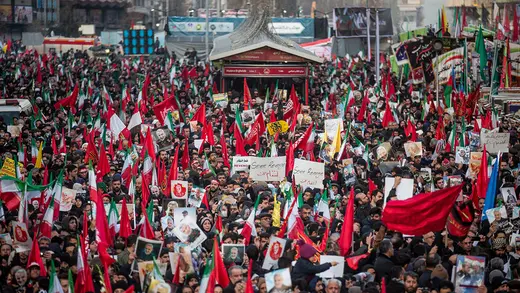Does the U.S. Strike on Soleimani Break Legal Norms?
The Trump administration’s killing of an Iranian military commander in Iraq raises questions about its legality under domestic and international law.
By experts and staff
- Published
Experts
![]() By John B. Bellinger IIIAdjunct Senior Fellow for International and National Security Law
By John B. Bellinger IIIAdjunct Senior Fellow for International and National Security Law
How significant is the strike on Iranian commander Qasem Soleimani from a legal standpoint? The Pentagon characterized it as a “defensive action.”
The killing of Soleimani, a senior military official of a country with which the United States is not at war, in a third country—without that country’s consent—raises numerous legal questions. Although the White House has not yet publicly stated the domestic legal basis for the strike, the president presumably relied on his constitutional authority as commander in chief and chief executive, given that Congress did not specifically authorize the attack.
Under Article II of the Constitution, the president has broad authority to order the use of military force not only to defend the United States and American individuals against actual or anticipated attacks but also to advance other important national interests. As I explained in Senate testimony in 2017 [PDF], when President Donald J. Trump was threatening to rain “fire and fury” on North Korea, presidents from both parties have in the past deployed U.S. forces and ordered the use of military force without congressional authorization on numerous occasions.
The president seemingly will not try to rely on either of the Authorizations for Use of Military Force (AUMFs) passed by Congress in 2001 and 2002. The 2001 AUMF is limited to the nations, organizations, and individuals who were responsible for the 9/11 attacks, so it would not provide authorization to use force against Soleimani. The 2002 AUMF authorized the use of force against Saddam Hussein.
When will the administration give its legal rationale for the strike?
On Saturday, the White House sent a report to Congress about the strike, as required under the 1973 War Powers Resolution. Such reports generally specify the domestic law basis upon which the president relied to use force. In this case, however, the administration took the exceptionally rare step of submitting a wholly classified report. It is surprising the White House did not submit an unclassified report, accompanied by a classified annex.

The legality of the attack under international law is dubious. Under the United Nations Charter, the United States is prohibited from using force in or against another country without that country’s consent or without the authorization of the UN Security Council, unless the use of force is in self-defense against an armed attack or to prevent an imminent attack.
If the Trump administration believed that Soleimani was planning imminent attacks against U.S. forces or U.S. interests, the strike would be lawful under Article 51 of the UN Charter and under general principles of international law—although other governments might not agree. U.S. Secretary of State Mike Pompeo has claimed that the strike was carried out in self-defense, but the administration has not yet provided evidence.
If the administration justifies the strike as an action in self-defense, the United States is required by Article 51 to promptly report the action to the Security Council. It has yet to do so. Such letters generally provide the legal basis for the use of force and the circumstances justifying it.
What does the strike on Soleimani say about the Trump administration’s targeted killing policy?
Trump has relied even more heavily than President Barack Obama on drone strikes to kill suspected terrorists in places such as Libya, Pakistan, Somalia, Syria, and Yemen. The Obama administration reportedly authorized close to six hundred drone strikes against terrorists during his eight-year term, while in its three years the Trump administration has conducted nearly three hundred drone strikes. Notably, the strike against Soleimani is the first time, to my knowledge, that the United States has launched a drone strike to kill a military official of a foreign government.
In conducting drone strikes against terrorists, the George W. Bush, Obama, and Trump administrations have generally relied on the same legal justifications: as a matter of domestic law, the strikes are authorized under the 2001 AUMF, while under international law, they are actions in self-defense to prevent imminent attacks.
Some media are calling this an assassination, an act that is banned under U.S. law. Is that an apt description?
If the administration concluded that killing Soleimani was a necessary action in self-defense, it would not qualify as an assassination under U.S. law. The Bill Clinton, Bush, and Obama administrations all concluded that the use of missile strikes or drone strikes against individuals planning attacks against Americans does not violate domestic or international law banning assassinations.
What role can Congress play given the rising tensions with Iran?
Congress has a vital constitutional role to play in authorizing and overseeing the use of military force. It also has the constitutional authority to declare war. Congress should insist on briefings on policy toward Iran and the legal justification for the strike against Soleimani, and should insist on prior consultation before any military action against Iran except in response to an attack by Iran. Congressional approval may be required before the president launches any military action that would be substantial or prolonged, or would pose a substantial risk to U.S. forces or American civilians.
Trump stated that he could target Iranian cultural sites in response to any retaliation by Iran. Would that be lawful?
Targeting Iran’s important cultural sites could violate the Hague Convention for the Protection of Cultural Property in the Event of Armed Conflict, to which the United States is a party. (The convention includes exceptions for cultural property used for military purposes or in cases of “military necessity.”) The Senate approved this treaty in 2008, with strong support from the Bush administration. When I was legal advisor of the State Department, I testified in support of the convention [PDF], as did representatives of the Department of Defense.
On Sunday, Secretary Pompeo said that if the United States uses force against Iran, the United States would only strike “lawful targets,” an apparent acknowledgement that targeting cultural sites would violate the Hague Convention.
